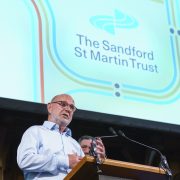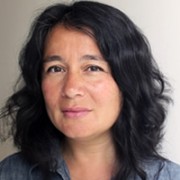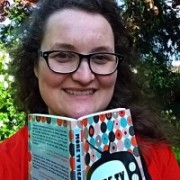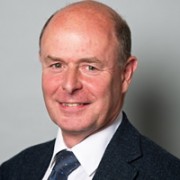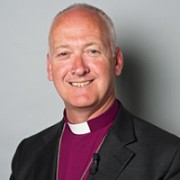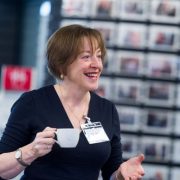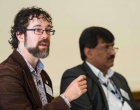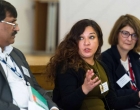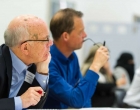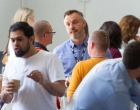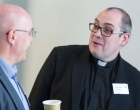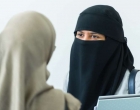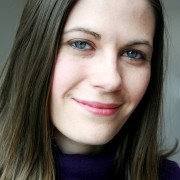Can reality TV tell us anything really important?
/0 Comments/in General, Religious broadcasting /by Anna McNameeHow should TV portray people of faith?
/0 Comments/in Awards, BBC, Broadcast policy, General /by Bryony TaylorWe watch a LOT of TV concerning religion, ethics or spirituality here at the Sandford St Martin Trust and so are particularly attuned to any buzz in the Twittersphere or the wider media around the portrayal of faith or the faithful on air. So it was that one of our trustees came across an open letter to the BBC from the Christian evangelist Canon J John and published on his website. Now, before you go any further, please note that at the Trust we don’t share the Canon’s opinions of the BBC’s output. Take a quick look at the shortlist for this year’s Sandford awards and you’ll find several bishops, one priest and many nuns. They appear across genres in dramas, factual and reality programmes – most of them broadcast by the BBC – and, we’d say, all of them realistically and sympathetically portrayed – which was no doubt a contributing factor to how they ended up on the Sandford St Martin shortlist in the first place. If you widen the scope of your survey even further to include people and practitioners of any faith, then you’ll find an even greater number of often nuanced and sensitive explorations of belief.
Bryony Taylor is the author of the very readable and informative “More TV Vicar?” which examines how Christians are representing on popular TV programmes and the soon-to-be Rector of Barlborough and Clowne in Derby Diocese. She has also been a stalwart of our awards shortlisting team for several years now and is something of an expert when it comes to how faith is portrayed on the telly. Her thoughts about how Christians are represented by the BBC, written in response to J John’s letter, below, was first published on her own website. She has generously given us permission to reproduce it here. If you want to read more about how “ordinary” Christians have been represented on TV then I’d recommend that part of her book dedicated to EastEnders’ Dot Cotton in addition to this blog and the readers’ replies on the Accultured website which also examine how mainstream programmes like “Suits” or “The Simpsons” deal with faith.
Representation of Christians on the BBC – my response to J John’s open letter
By Bryony Taylor
A few weeks ago Canon J John published an open letter to the BBC about its poor representation of Christians and Christianity on the BBC. He chooses two very obscure examples (a 4 minute film about motivational speaker Nic Vujicic on the London local BBC website and a documentary about Usain Bolt) to decry the fact that their Christian faith is not referred to in either programme. J John then goes on to say:
“So we come across the bumbling and inoffensive ‘More Tea Vicar’ cleric who is clearly related to Mr Bean; the sort of edgy figure apparently portrayed in the current drama Collateral who is a lesbian vicar in a relationship with a drug-taking illegal immigrant; or (perhaps increasingly) the naive ‘happy-clappy’ charismatic, untroubled by reality of any form. Where are the mainstream figures? Those people – doctors, teachers, MPs, mothers, even vicars – who have a conventional, thoughtful Christian faith and who happily live it out in their daily lives? I’m not asking for perfection but I would like representation.”
This is entirely the territory that I explore in my book More TV Vicar? I did argue at the time I wrote it that the reason we don’t see ordinary Christians portrayed on television is largely because they’re not that entertaining to watch! I’ve had to eat my words, however, a fair bit in the last year or so as we’ve seen TV series like Broken (about which I have written with some friends a forthcoming discipleship course) that not only portrays Christians but Christian worship in every single episode. Call the Midwife (to which J John does refer, somewhat reluctantly I feel) is also one of the best portrayals of ordinary people of faith on television – and this has a very large audience. We had A Vicar’s Life – a four part documentary about the lives of 4 priests in rural Herefordshire on the BBC in January. This last year we have seen quite a high proportion of Christians on the BBC and largely from a very positive perspective. It makes me wonder what J John is watching. I’d like to know the programmes in which he’s seen the bumbling vicar stereotype recently – I haven’t seen one for years. J John also complains about Thought for the Day suggesting that the (Christian I presume) speakers believe less than their listeners (which is just an absurd claim). Thought for the Day is not a spot for evangelism: it’s a privileged 3 minutes taken out of a 3 hour programme to allow for just that: something that will stimulate thought about the things of the spirit
The BBC are actually working quite hard (as outlined in this article here) to respond to the perceived ‘anti-Christian’ bias through their Easter programming which includes Pilgrimage: The Road to Santiago – about some celebrities walking the Camino together.
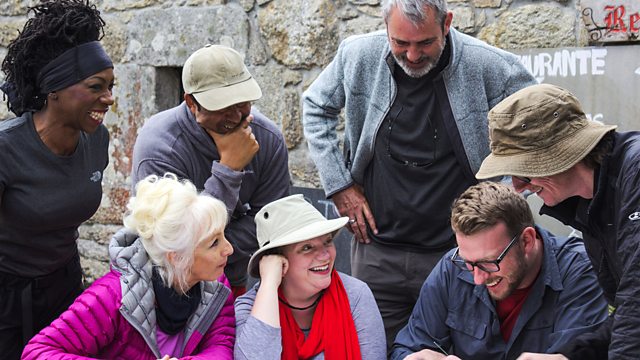
I’m not quite sure where J John is coming from in writing this open letter. He refers (slightly skirting around the topic) to LGBTQ issues and Christianity – I think implying that he thinks that Christians who are not affirming of LGBTQ people should be able to have a voice and treated with respect. What he perhaps is feeling uncomfortable about is that non-affirming Christians are beginning to be in the minority now, even in evangelical circles. He also brings out the old chestnut ‘you wouldn’t say that about Islam’.
I can’t help but feel that there is an element of the adage ‘when you’re accustomed to privilege, equality feels like oppression’ about this open letter. Just because other religions are handled on television too doesn’t mean that Christianity is being ‘airbrushed out’ or deliberately ignored. It reminds me of how when I began my ministry coming into a parish with a female rector and associate priest (meaning that I’m in an all-female ministry team) of how some people said to me ‘that doesn’t sound very healthy’ – completely forgetting the fact that for centuries every single ministry team has been all male and no one ever felt that would be ‘unhealthy’.
J John’s demands at the end of the letter are as follows:
“To conclude, what would I say we Christians are asking for from the BBC? I think we are asking for three things. First, we would like fairness: can we be treated in the same way as other faiths are treated? Second, we would like courage: a decision to present both Christianity and Christians as they exist in reality (past and present) rather than by ignoring or stereotyping them. Third, we would like to see an earnestness that would look at the issues of faith with intelligence and insight. Can we be treated seriously? Please?”
I would suggest that the BBC are already doing most of this. Being on the shortlisting panel for the Sandford Awards has given me a great opportunity to view some superb religious programming – much of it from the BBC. I would suggest J John and those who agree wholeheartedly with his letter have a look at this year’s nominees for the Sandford Awards and see how Christians are far from being ignored and how issues of faith are looked at with intelligence and insight on British television.
Ofcom and religious programming on the BBC
/0 Comments/in Broadcast policy, General /by Anna McNameeMeaning and the Media – the Sandford St Martin Awards 2017
/0 Comments/in Awards, General /by Angela GrahamOn the evening of 7 June the 2017 Sandford St Martin Awards were handed out during a gala ceremony held at Lambeth Palace. Again this year, the Trust had the honour of hosting some of the most talented programme-makers, broadcasters and journalists engaging with the subject of religion, belief and ethics in the UK today. Among them was the TV producer and writer Angela Graham who has written about the Awards in her blog.
Photos below are by Charlie Fordham-Bailey
Angela’s profile photo on the ‘Latest Posts’ page is copyright @HirstPhotos
Meaning and the Media – the Sandford St Martin Awards 2017
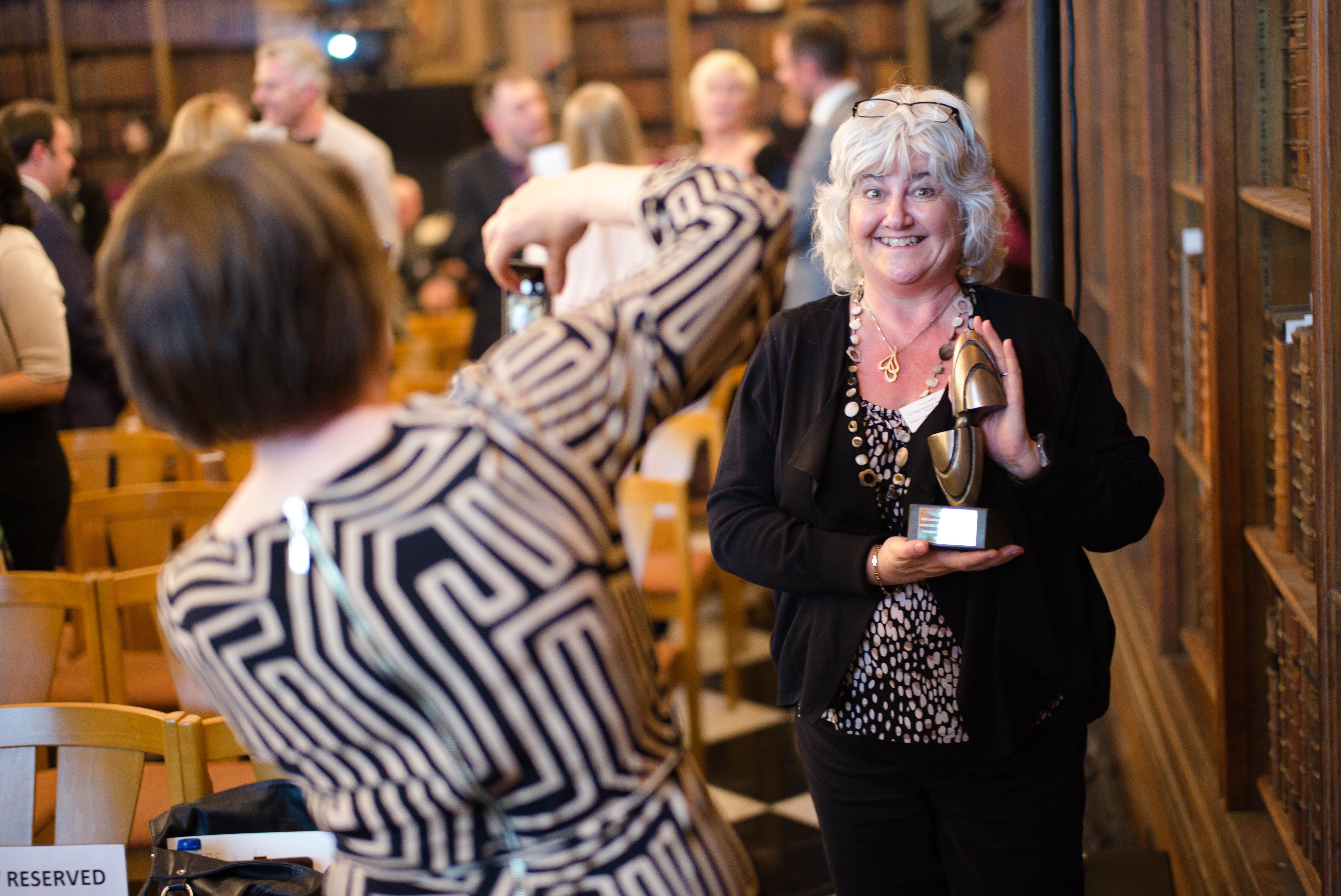
Karen Walker, Producer of ‘All Things Considered: Aberfan 50 Year Anniversary’ made by the Religious Programmes Department at BBC Radio Wales, winner of the 2017 Radio Award, photos by Charlie Forgham-Bailey
by Angela Graham
The Sandford St Martin Awards made me greedy. How could they tempt me with such a rich list of nominations and not expect me to want to indulge in all of them as quickly as possible!
Marian Partington on forgiving Fred and Rose West who killed her sister, or the great Marilynne Robinson on Fear, both in the Interview of the Year shortlist, or ‘Muslims Like Us’ with its reality-tv take on a major faith’s diversity and unifying core or, ‘The Selfless Sikh’ about a faith impelling humanitarian action … Could you blame me for wanting to absorb them all straight away?
Despite the range of topic and approach across the 30 finalists there is a prominent common factor, and it’s what makes the line-up such an attractive one: engagement with why people are making particular choices; helping or damaging others; living as they do. The programmes examine not only who’s doing what, when and where but the deep motivations that push them to grapple with the tangibles and intangibles of life.
Such interrogation is not confined to Religious Programming but this genre steps out into that intriguing area of an individual’s relationship to a Being or a Universal Agent and the ramifications of that for a person’s relations with others: the religio part of religion, the One with the Many. And the Absolute – it takes that on too.
The truths we live by appear to be increasingly various. Even those who live within the parameters of the most established of creeds must attend to a multiplicity of belief positions around them. I will definitely be looking out for the radio documentary, ‘Canada’s Atheist Minister’ (BBC Production North for BBC World Service) which offers insight into the experience of a pastor who found herself delivering a sermon in which she stated that she didn’t believe ‘in a God who answers prayer’ or fulfil many of the requirements usually expected of a deity and certainly not a Christian one. Radio can put me in touch with this fascinating experience.
I’d say it’s easier to get below the surface of atheism in Britain via the media than in face-to-face encounters. There is a substantial amount of ecumenical and inter-faith activity but far fewer opportunities for dialogue in depth between those of religious faith and those without it. This is the Cinderella dialogue in my own Church, the Catholic, despite encouragement from the Vatican.
Several years ago I trialled such an encounter group in Cardiff, calling it Meaning To Live because that name seemed to me an indication of the common ground. I don’t think we hit on the perfect methodology but we found a way to have the sort of open, mutually respectful, willing-to-learn, robust conversation we hadn’t found the opportunity to have anywhere else.
It concerns me that we don’t have many arenas in which we can examine belief in the sense wider than, but including, the religious. This is one reason why the media are so important and why it’s equally important to provide media professionals with the tools to handle issues of belief and faith well.
On the Sandford St Martin site are two blogs I’ve written about an initiative for journalists run by the training arm of the NUJ in Wales. This aims to give journalists access to expertise and resources which can enable them to improve their coverage of news and current affairs that have a religious or belief aspect. In Wales, until I gave a modest class on the subject this January at Cardiff University, no School of Journalism had offered any teaching at any level on religious literacy and, before these workshops, there was nothing on offer for professionals either. I’m glad to say the interest has been significant and we’re in discussion about a third event.
The profile of religious literacy is rising and, as it does so, critique of justification for it and of its worth relative to that of sociology is needed. Prof. Adam Dinham’s work at Goldsmith’s is prominent. His book, Religious Literacy in Policy and Practice Bristol: Policy Press Dinham A & Francis M (eds) (2015) is essential reading.
It’s good to see the current BBC review of its Religious, Ethics and Philosophy programming under Mark Friend. If the Sandford shortlist is anything to go by, it’s the PSB BBC that is doing the heavy lifting in these fields.
As a broadcaster in Wales it was an especial pleasure for me that the Radio Award was won by ‘Aberfan 50 Year Anniversary’, a programme within the long-running, weekly religious affairs series, ‘All Things Considered’. Director, BBC Cymru Wales, Rhodri Talfan Davies tweeted last night, ‘Quality counts − a superb team who deliver each and every week’. They certainly do. Producer, Karen Walker and Presenter, Roy Jenkins are ‘modest beyond’, as the Welsh say. Karen would never tell you that the walls of her office are invisible beneath the array of awards acquired over the years. Now they have a trophy to find a spot for.
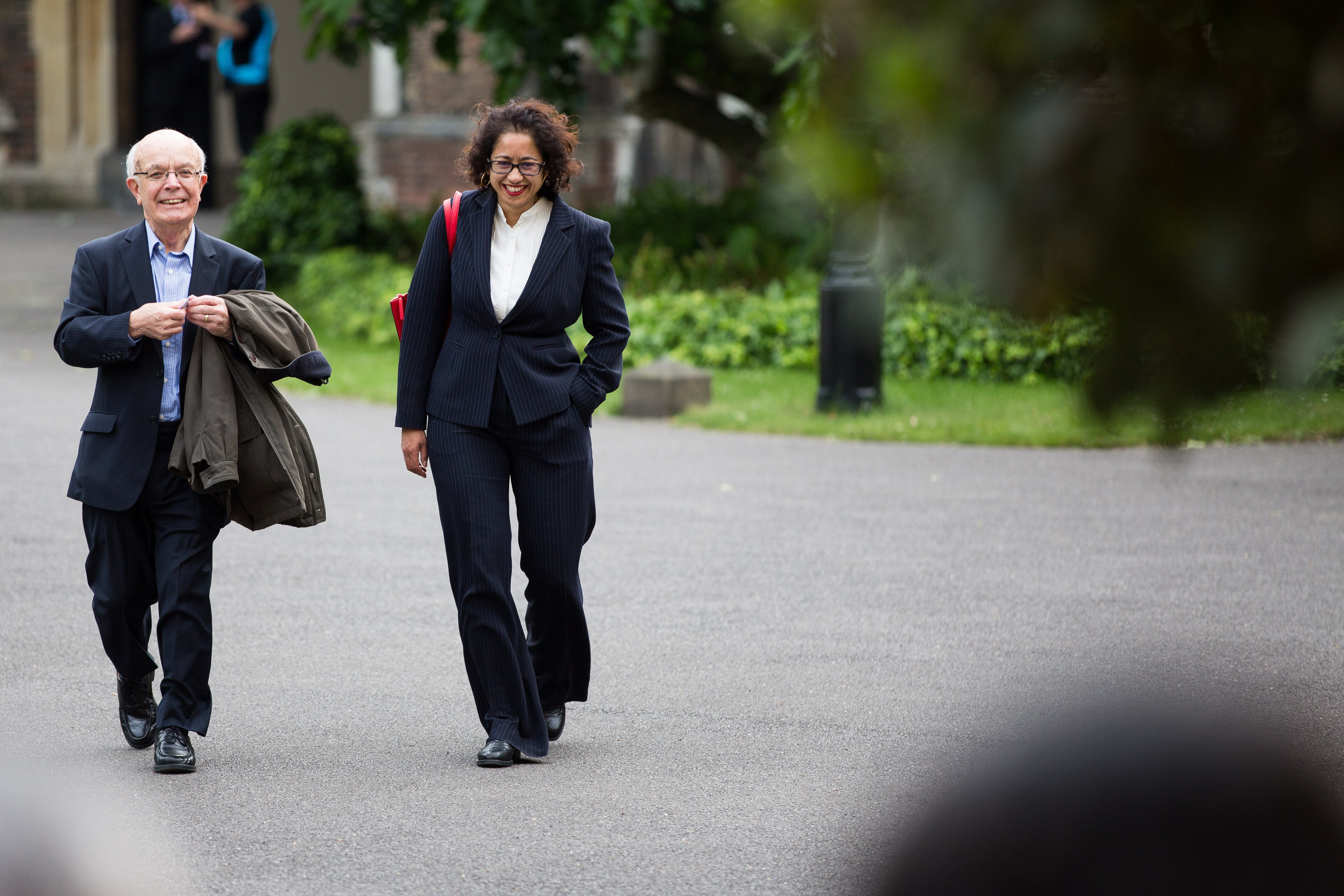
Rev Roy Jenkins with fellow broadcaster Samira Ahmed arriving at the Sandford St. Martins Awards 2017 held at Lambeth Palace.
For a full list of the 2017 Sandford St Martin winners click here.
Find out more about Angela on her website: http://angelagraham.org/
Reporting Belief 2017: An appetite for engagement
/0 Comments/in General, Outreach /by Angela GrahamGiven current geo-politics and the nature of conflict and social strife across the globe, religious literacy has become more important than ever – and journalists and broadcasters have a key role to play. Because religious literacy is not only an understanding or familiarity with religious texts or practices, it’s also an understanding and appreciation of how people’s beliefs or religions shape their politics, their communities, their relationships and their hopes for the future. And so for journalists, if you’re lacking the tools or experience to understand the role religion or belief plays in human affairs, you’re unequipped to properly understand or communicate to your audience what the story is. Religious literacy matters. Increasingly so.
In Wales, NUJ Training has been energetic in helping journalists engage with belief (and in helping belief communities to engage with journalists) by offering participants expertise, resources and the opportunity both to examine their own personal viewpoints while honing their professional skills.
In November 2016, two young Sandford St Martin interns blogged for us about “When Religion Makes the News” the first NUJ Training workshop held with ITV Wales. Below the Welsh journalist and trainer Angela Graham, writes about their latest event “Reporting Belief 2017” held in May.
This blog was first published on the NUJ Training Wales website and is reproduced here with their kind permission.
Photographs are by Natasha Hirst @HirstPhotos
Reporting Belief 2017: an appetite for engagement
By Angela Graham
What a day! At Reporting Belief 2017 on May 10th (#RB17) two ‘communities’ who often clash − journalists and ‘believers’ – came together to understand one another better. Of the 88 people who attended, 44 were journalists from press, broadcast and online media.
An immediate, ground-breaking result is ITV Cymru Wales’s offer to do a series of feature reports of around 3 minutes on their nightly news show Wales At Six on a range of belief groups in Wales over a period of around a year.
In the context of the BBC’s current review of its output in Religion, Ethics and Philosophy this commercial broadcaster’s imaginative initiative – beyond the terms of its licence − raises the profile of belief on English-language TV in Wales at a stroke given the scant provision by BBC Cymru Wales of English-language factual TV output in these areas.
But this was a day focused on news, and on quality of engagement rather than breadth of output.
Two ‘communities’ wanting to engage: understanding ‘those who are not like us’
Reporting Belief 2017, held on 11th May at BBC Cymru Wales’ Cardiff centre, followed on from When Religion Makes the News (#ReportingBelief16) last November, a workshop for journalists and representatives from the spectrum of beliefs and ideology in Wales about religious literacy and the reporting of belief.
At #RB17, representatives of religions, and of belief systems such as humanism, shared with journalists ways in which they feel misunderstood and misrepresented; journalists, in turn, explained their frustrations with belief communities who don’t engage well with the realities of the media.
This was a bold example of collaboration to address a challenge that affects us all: how to understand those who are not like us, in this case in the area of faith and belief. The mutual willingness to overcome these gaps demonstrated a readiness for a new kind of relationship.
Wales leading the way
Reporting Belief 2017 is at the forefront in meeting a need that is felt ever more acutely by communities around the UK. Dr Sheila Gewolb, Vice President of the Board of Deputies of British Jews, recognised this warmly in saying, ‘We applaud your event. This particular kind of encounter and dialogue is not happening in London. The Board of Deputies is taking a keen interest in it.’
There can be no doubt now of the appetite for training and resources – journalists need input which helps them both understand the complexities of belief (whether religious or secular) and the journalist’s role in interpreting the effects of belief on society; ‘believers’ need opportunities to learn how to engage productively with the media.
Filling the training and research gaps in religious literacy
How can such training for journalists be resourced and provided? A case is building for universities in Wales to bring religious literacy into the curriculum for journalism courses, at least at post-grad level. Cardiff University School of Journalism, Media and Cultural Studies is ‘actively discussing’ this option.
But it is essential, in such training, to have objective expertise in religion and belief that is independent of institutional or credal claims. There is a pressing need for research related to Wales, currently under-represented in resources in this area.
Media organizations themselves can examine the adequacy of their in-house training.
A case-study in journalistic practice
The day began with a session for journalists: Muslim Communities – connecting with the grassroots. Three experienced BBC journalists offered best practice advice, chaired by Dr Michael Munnik from the Centre for the Study of Islam in the UK at Cardiff University.
Sajid Iqbal, a senior broadcast journalist with BBC News in London, advised, “If you don’t understand Pakistan you don’t understand the Muslim communities in Britain.” Muslims of Pakistani origin represent the largest single ethnic group among Muslims in the UK.
He recommended getting to know the networks of Pakistani journalists in the UK, explaining that many are not full-time but are resourceful and well-connected at local levels, aspiring to do good journalism. “Stories come from relationships”, he said. The centrality of relationships was a mantra throughout the day.
Yasminara Khan is a journalist at BBC Newsnight who has done much work on Asian women’s issues. She stressed the importance of ‘talking to everyone’ and of getting strong case studies which only come if you show you are trustworthy: “If people feel you can deliver that story accurately they will give it to you.”
Innes Bowen is the author of Medina in Birmingham, Najaf in Brent: Inside British Islam, about the networks behind the UK’s mosques. She is in charge of investigations at BBC Newsnight. She encouraged journalists to make good use of their personal strengths to create connections widely with people. She is “into analytical journalism, the detailed stuff” and this had led her to spot novel angles such as a story about the inadequacy of the census returns concerning Somalis which led to them being under-represented and their interests under-funded. But, she stressed, this needs to be supported by a willingness to invest time with people, to spot a story in what, at first glance, appears to be a Public Service Announcement.
The need for open fact-sharing
A lively plenary session followed in which the broadcasters’ records on diversity and portrayal were challenged, as were some of Innes Bowen’s statistics about the managements of mosques in Wales and inferences that can be drawn about the denominational allegiances of worshippers from those of mosque management committees. This exchange underlined the need for both open fact-sharing and discussion of perceptions and experience.
Emma Meese and Matthew Abbott of Cardiff University’s Centre for Community Journalism (C4CJ) delivered excellent afternoon workshops on social media use and the writing of press releases.
“Above and beyond the frustrations with each other is a common desire to communicate things that matter”
This was an event full of variety and of life. The ‘believers’ who attended, whether religious or secular, are engaged with living meaningful lives; journalists thrive on the vital, the real, the now. Above and beyond the frustrations with each other is a common desire to communicate things that matter.
The NUJ Training Wales website will shortly add to its religious literacy resources some additions arising from the day.
The event was free due to NUJ Training Wales’ funding from Welsh Government and support in kind from BBC Cymru Wales and C4CJ. Currently, the NUJ is exploring funding sources to continue this important, innovative work.
Feedback from the event shows an appetite for greater in-depth encounter between journalists and believers.
Beyond News, the ways in which broadcast genres engage with Religion and Belief, Ethics and Philosophy (via news, current affairs, documentary, factual formats, drama etc) across radio, TV and online require careful distinction and consideration; as do the claims of these areas within a Public Service Broadcasting and a Commercial media menu. But that’s another chapter in the story.
_______________________________________________________________
Photographs by Natasha Hirst @HirstPhotos
You have permission to use these photographs for purposes related to this event (e.g. for newsletters). If you would like to use any for general purposes such as a profile picture on your website please contact
Natasha Hirst: natasha@natashahirst.co.uk
For more information about NUJ Wales Training and their work, visit their website or follow them on Twitter @NUJTrainWales
Inspiring interviews
/0 Comments/in Awards, General /by Bryony TaylorWith the ever-increasing number and quality of entries received by the Trust year on year, judging the Sandford St Martin Awards has become more and more of an immersive experience. Not least for our shortlisters who are charged with having to negotiate long lists of sometimes very different programmes, made for very different audiences with hugely varying budgets. Agreeing a final few for the shortlist is never an easy task and, what shortlisters tell me is that, even after the final list has been agreed, they’re often “haunted” by a programme that personally resonated with or inspired them but isn’t in the final running for an Award.
Such is the case with Bryony Taylor, a priest and the assistant curate at St Michael and All Angels Church in Houghton-le-Spring, who helped shortlist in this year’s Interview category. In a vlog, originally posted and which you can watch on her own website, Bryony drew inspiration from “A Thousand Words” with Iain Campbell, a programme made by GRF Christian Radio for the smallVOICE podcast.
Iain Campbell is a portrait painter and Artist in Residence at St George’s Tron Church of Scotland in Glasgow city centre. In this interview he talks about his painting ‘Our Last Supper‘.
Inspired, Bryony used the painting to inform her own meditation for Lent.
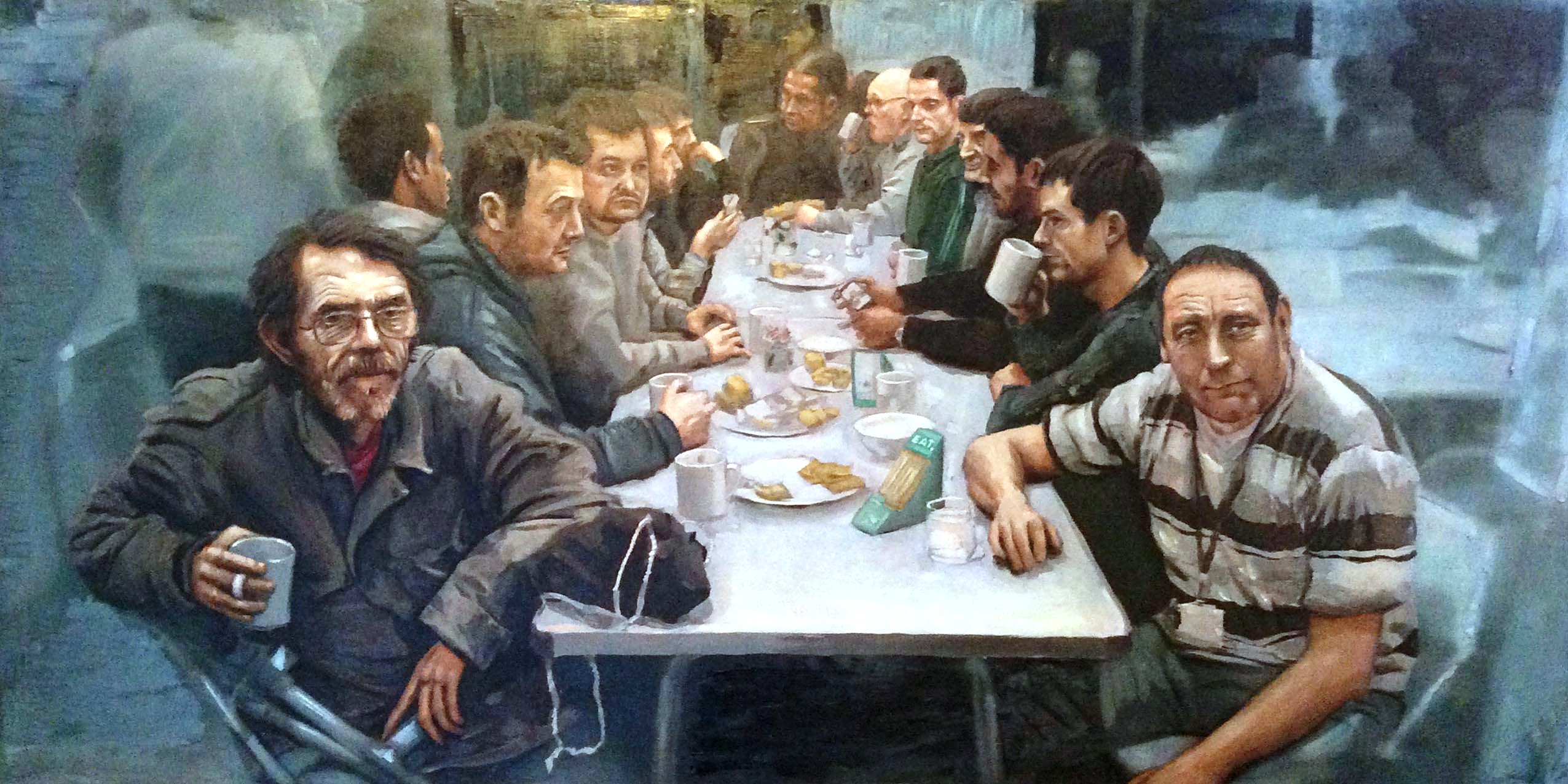
This is a painting imagining a modern day Last Supper – Jesus with his disciples around a table. The figures in the painting are the men that attend a homeless charity in Glasgow. Our images of Jesus and the disciples are often sanitised. We have images of men in long flowing robes with beards and halos walking around. In reality, Jesus based his ministry in the forgotten North East of a forgotten part of the Roman Empire. The back of beyond, literally. He chose as the people to spend his time with, those on the edge of the community. The people excluded by others. The poor fishermen scratching a living on the shores of Lake Galilee. A young man that was part of a terrorist cell seeking to resist the Roman occupation. A hated employee of the government, a tax collector. Not to mention various women, some of whom had a history of mental health problems, others who were wealthy widows who put the lads up when they were visiting from town to town.
Look at this painting.
Many people ask which one of the men is Jesus. But the artist deliberately left it unclear. Judas had to go over in the Garden of Gethsemane and embrace Jesus to let the guards know which one Jesus was; it wasn’t obvious which of them was Jesus.
Where do you see Jesus?
Do you see him in different places, in different people?
The artist chose to paint the Last Supper because Jesus said ‘Do this in remembrance of me’ – share a meal together to remember me. Don’t remember me in the isolation of the cross, all alone. Remember me among friends, around a table, enjoying food together. This is how I want you to remember me.
Our thanks to smallVOICE, Iain Campbell and Bryony for sharing their work with us. It’s worth knowing both that you can see the original of Iain’s painting at The Wild Olive Tree café in Glasgow and that Bryony is the author of the book ‘More TV Vicar?‘ a enthusiast’s romp through the annals of British television to discover what Christians on television say about our attitudes to religion and the religious.
CONTACT US
Sandford St Martin Trust
Church House
Great Smith Street
London
SW1P 3AZ
Email: info@sandfordawards.org.uk
Tel: 07749875477
Recent blog posts
- A Letter from Ukraine February 4, 2025
- Reflecting the Nation: The BBC’s efforts to represent the UK’s diversity December 20, 2024
- Timely documentaries exploring assisted dying October 16, 2024
JOIN OUR COMMUNITY
At the Sandford St Martin Trust we’re interested in how religion and belief are portrayed in the broadcast media. We believe that faith – whether you have it or not – plays a complex role in human experience and that a better understanding of what people believe can support stronger secular communities. Think that sounds interesting? Why not sign up for our newsletter and join us at one of our forthcoming events aimed at stimulating and contributing to the debate around what is good religious content.
We look forward to meeting you!


